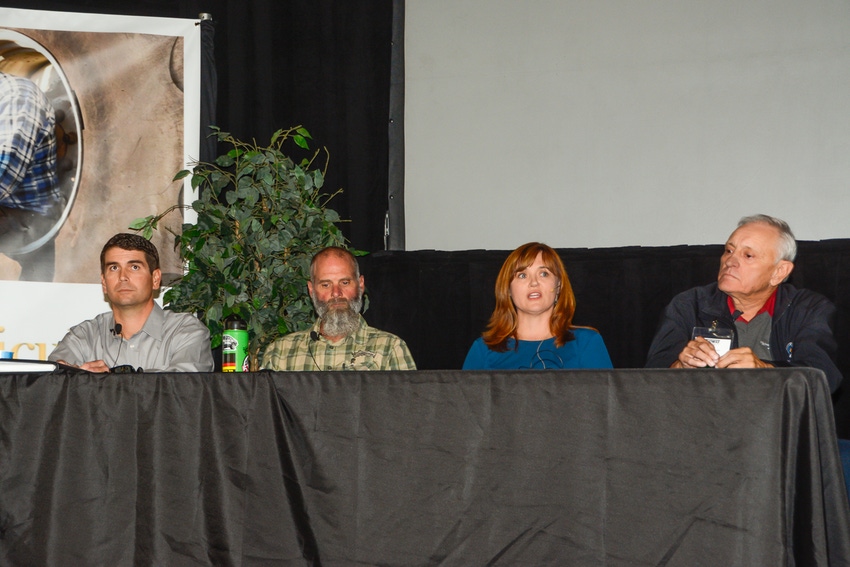November 16, 2017

Growers attending the North State Innovations in Agriculture Conference heard from peers about how they address the onslaught of regulatory challenges that makes California perhaps the most expensive place to farm in the United States, if not the world.
Labor issues were woven throughout the discussions as growers talked candidly about declining work ethics and how mandated wage and hour changes continue to push to greater automation and the need for fewer employees. All this is aimed at protecting thin margins to keep financial ledgers printed in black ink.
Farmers representing tree nuts, rice, olives and a large northern California brewer shared how they address challenges in a state some say is unfriendly to agriculture.
Agricultural leaders shared their insights during a producer panel discussion moderated by Roger Isom of the Western Agricultural Processors Assocation. Panelists included: Lau Ackerman, agricultural manager for Sierra Nevada Brewery at Chico; Jessica Lundberg, vice president of administration with Lundberg Family Farms at Richvale; Dennis Burreson, vice president of field operations with Musco Family Olive Company at Orland; and, Dan Pronsolino, manager of Dunnigan Hills Hulling and Shelling at Woodland.
Isom guided panelists through questions dealing with a variety of regulatory issues, including air quality, water, and labor. He illustrated costs of growing and ginning cotton along a boundary marked by the Colorado River that separates California and Arizona. He says Arizona cotton gin operators pay half the price for workers compensation insurance than peers across the Colorado River in California. Moreover, California cotton gin operators pay up to $10 per bale more to gin cotton than their counterparts to the east.
Labor: Not just about pay
Automation was the common refrain among the panelists, who agreed that it is not just employee costs, but a general lack of work ethics that causes problems for some employers.
“We’ve been so disappointed in the average employee comes out so we’re simply focusing on automation,” Dan Pronsolino said.
Dennis Burreson has seen it in the generational differences of laborers over the years. Where the grandfather of today’s farm employee would arrive at sunrise and stay until sunset, today’s employee may arrive about 9 a.m. and stay only a few hours, he says.
“I don’t think it’s a function of pay,” Pronsolino continued. “We’ve increased our pay rates numerous times and have seen no response.”
Pronsolino shared about a neighboring fresh market organic tomato grower who paid the equivalent of $31 per hour for piece-rate labor, and still could not attract a full crew this year. The farmer lost marketable crop as some of it rotted on the vine, he said.
Jessica Lundberg works with local temporary employment agencies, offering tours of the farming operation so they can better understand the hard work in rice operations. The idea is to ensure that potential employees sent from these agencies understand the nature of the work before they arrive.
She also highlighted the challenge of proximity to Sacramento and the Bay Area for jobs in finance, sales and marketing at the family operation southwest of Chico. In those cases, they compete against higher-paying jobs within two hours of the rice fields and processing facilities in Richvale.
Lundberg Farms, a vertically-integrated organic rice operation, markets its branded products and employs about 350 people.
“Some folks want to take three months off of work and go to Mexico with the hope that their jobs and benefits will be here when they get back,” she explained.
Lundberg hosts hiring fairs about eight weeks ahead of peak-season needs.
“This seems to work well,” she said.
To address the growing cost of workers compensation insurance, Lundberg Farms partnered with another agricultural company to self-insure, rather than suffer the rising costs of insurance on the open market. Lundberg says this cut their insurance costs in half.
Olives
Table olives have not been traditionally easy to harvest mechanically, but that is changing, says Dennis Burreson. Further challenging the industry has been trade issues and European subsidies that put the U.S. industry at a disadvantage in world markets.
Burreson says this could soon change as federal trade officials address issues that could put U.S. producers on a more level playing field in world markets. If this happens, Burreson expects California table olive acreage could increase significantly as Golden State growers already out produce international competitors on a per acre basis.
One way California table olive producers are trying to draw consumers is new “Olives to Go” packaging, which mimics the small serving-size containers one might see for snack-food items. Ready-to-eat olives are packaged in small, plastic containers as a “grab-and-go” item.
“We literally can’t keep up production for the demand,” Burreson says.
Beer
Lau Ackerman oversees farming operations at Sierra Nevada Brewery in Chico, which grows hops for brewing, plus organic vegetables in a garden a few steps away from the kitchen that serves locally-sourced food in its popular restaurant. The garden has become a value-added component of the operation as Sierra Nevada promotes the restaurant through conversations with the chef and patrons.
Not long ago the brewery enjoyed double-digit growth and success. Market forces pushed the craft beer industry on its head as there are now about 6,000 craft breweries across the nation. Legalized cannabis could further put the brakes on growth in the domestic craft beer industry, he believes.
Shrinking margins in the industry have pushed Sierra Nevada Brewery to find new brewing efficencies.
You May Also Like




